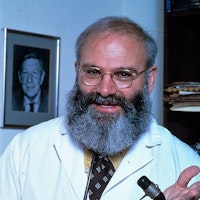Music, uniquely among the arts, is both completely abstract and profoundly emotional…
Uniquely Among the Arts
Topic: Creativity, Culture, & the Arts
Music, uniquely among the arts, is both completely abstract and profoundly emotional. It has no power to represent anything particular or external, but it has a unique power to express inner states or feelings. Music can pierce the heart directly; it needs no mediation.
Oliver Wolf Sacks was born on July 9, 1933, in Cricklewood, London, to a family deeply rooted in medicine and science. His father, Samuel Sacks, was a physician, and his mother, Muriel Elsie Landau, one of the first female surgeons in England. Sacks studied medicine at The Queen’s College, Oxford, earning a BA in physiology and biology in 1956 and completing his clinical training in 1958. Early exposure to anatomy and his family’s scientific background shaped a lifelong interest in the workings of the mind. After completing his medical studies, Sacks moved to North America in 1960, eventually settling in the United States, where he spent most of his career.
Oliver Sacks is widely known for his work in neurology and for his writing, which explored the lives of people with neurological conditions. His 1973 book Awakenings, based on his treatment of post-encephalitic patients at Beth Abraham Hospital in the Bronx, received wide recognition and inspired a film in 1990. His writing blended clinical knowledge with personal narrative, making complex medical conditions more understandable. Other notable works include The Man Who Mistook His Wife for a Hat, An Anthropologist on Mars, and Musicophilia, each highlighting the ways individuals adapt to neurological changes.
Sacks valued both scientific accuracy and the lived experience of his patients. His writings often focused on the unusual capabilities that can emerge through illness or impairment. He taught and practiced medicine for decades, with faculty positions at institutions including the Albert Einstein College of Medicine, NYU, and Columbia University. In his final years, Sacks wrote more openly about his personal life, including his relationship with writer Bill Hayes. Diagnosed with terminal cancer in early 2015, he faced death with openness and reflection. He died on August 30, 2015, in New York City at the age of 82, leaving a lasting contribution to both science and literature.
Musicophilia
Sacks, Oliver and Daniel Glaser. Musicophilia: Tales of Music and the Brain. Picador, 2018.

Oliver Sacks
Theme: The Musical Arts


About This Oliver W. Sacks Quotation [Commentary]
In Musicophilia, Oliver Sacks writes that music is “both completely abstract and profoundly emotional,” a contrast that defines its power. While music does not depict external scenes or tell stories directly, it communicates inner states and feelings with immediacy. Sacks notes that music “has no power to represent anything particular or external,” yet it expresses what words cannot. This paradox—its lack of literal content alongside its emotional clarity—makes music distinct among the arts.
Sacks describes a moment when this quality became visible in shared silence and listening. On the anniversary of September 11, a young man played Bach’s Chaconne in D minor in Battery Park. A quiet crowd gathered, drawn by the music’s presence. As Sacks observed, the music “brought them some…consolation, in a way that no words could ever have done.” It did not explain or narrate their grief, but it allowed each listener to feel it, and to feel it in a way that also brought relief.
Reflecting on this, Oliver Sacks writes, “Music can pierce the heart directly; it needs no mediation.” Whether or not one knows the story behind Dido’s lament, “anyone who has ever lost someone knows what Dido is expressing.” In music, pain and consolation coexist. For Sacks, this is the paradox at its core—music intensifies what we feel, and in doing so, helps us bear it. Within the musical arts, it offers a form of understanding that is both abstract and deeply felt.
Maria Popova About Oliver W. Sacks
In one particularly poignant passage, emanating his usual gift for exposing the monumental through the minute, Dr. Sacks captures the heart of music’s strange power over us by reflecting on a fleeting moment that took place on the fifth anniversary of the September 11 attacks:
“On my morning bike ride to Battery Park, I heard music as I approached the tip of Manhattan, and then saw and joined a silent crowd who sat gazing out to sea and listening to a young man playing Bach’s Chaconne in D on his violin. When the music ended and the crowd quietly dispersed, it was clear that the music had brought them some profound consolation, in a way that no words could ever have done.
Music, uniquely among the arts, is both completely abstract and profoundly emotional. It has no power to represent anything particular or external, but it has a unique power to express inner states or feelings. Music can pierce the heart directly; it needs no mediation. One does not have to know anything about Dido and Aeneas to be moved by her lament for him; anyone who has ever lost someone knows what Dido is expressing. And there is, finally, a deep and mysterious paradox here, for while such music makes one experience pain and grief more intensely, it brings solace and consolation at the same time.” —Oliver Sacks, Musicophilia.
—Maria Popova, Brainpickings [Oliver Wolf Sacks, CBE, Musicophilia: Tales of Music and the Brain].
Resources
Related Quotes
Copyright © 2017 – 2026 LuminaryQuotes.com About Us